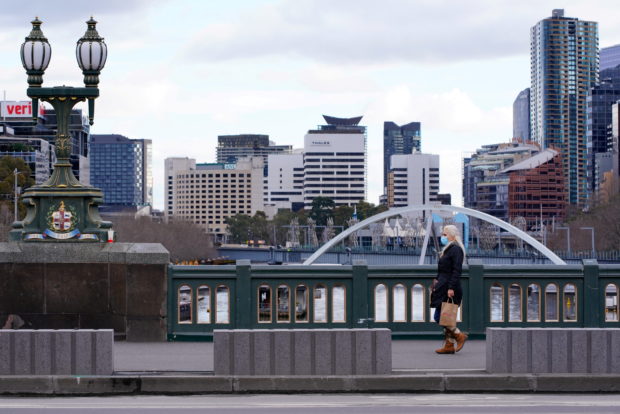
A lone woman, wearing a protective face mask, walks across an unusually quiet city centre bridge on the first day of a lockdown as the state of Victoria looks to curb the spread of a coronavirus disease (COVID-19) outbreak in Melbourne, Australia, July 16, 2021. REUTERS FILE PHOTO
SYDNEY — Australia’s most populous state reported a rise in new COVID-19 cases on Monday despite a weeks-long stay-at-home order, while police vowed to crack down on any repeat of a anti-lockdown protest which turned violent at the weekend.
New South Wales, which has had more than 5 million people in Sydney city under lockdown for a month, reported 145 new cases of the virus, from 141 a day earlier, as it struggles to contain an outbreak of the highly contagious Delta variant.
The state also reported two new deaths, a man and a woman both in their 80s, taking its total fatalities to 10 since the flare-up began a month ago and the national total to 920 since the start of the pandemic.
Of particular concern, 51 of the newly diagnosed were active in the community before testing positive, raising the risk of transmission. The authorities have said they want that number near zero before lifting the city’s most restrictive lockdown of the pandemic at a July 30 target date.
“We might need to go harder in some areas and release some settings in others,” state premier Gladys Berejiklian said at a televised news conference, apparently referencing five government areas of Sydney’s suburbs at the epicenter of the outbreak.
Berejiklian added that she would give an update on movement restrictions in the next few days.
At the weekend, thousands of people marched in an anti-lockdown protest which turned violent in central Sydney, an event that state chief health officer Kerry Chant called “distressing”.
As images and videos of the protest circulated on social media, including one image of a man apparently punching a police horse in the head, state police commissioner Mick Fuller said some 10,000 people had called the police hotline to report people suspected of breaking lockdown orders.
The calls to police were “an amazing outcry by the community, not just in terms of their disgust at the protest but at the way the police were treated”, said Fuller.
Police knew of plans for a repeat protest and similar behavior “won’t be tolerated again”, he added.
Victoria state, also under lockdown, reported 11 new cases, although all were in quarantine during their infectious period. Authorities said they would decide the next day whether to lift restrictions as hoped.
Neighboring South Australia said it was on track to exit its snap one-week lockdown on Wednesday, after reporting one new local case, also in quarantine through their infectious period.
Vaccine rush
The outbreak, sparked by an infected airport transit driver in Sydney, has resulted in thousands of new cases of the fast-moving Delta variant and reimposed lockdown on more than half the country’s 25 million population.
With only about 16% of Australians aged over 16 years so far fully vaccinated, the country’s main drug regulator on the weekend changed its recommendation to encourage wider takeup of the AstraZeneca Plc vaccine.
The Australian Technical Advisory Group on Immunization (ATAGI) had previously recommended restricting the AstraZeneca shot, the main vaccine in the country’s immunization arsenal, to people aged over 60 due to an extremely rare risk of blood clots in younger people.
Many Australians including those over 60 had opted to wait for an alternative made by Pfizer Inc which has had its use restricted to people aged 40 to 60 due to supply constraints.
ATAGI on the weekend recommended that all adults in Sydney should now “strongly consider the benefits of earlier protection” with the AstraZeneca jab.
The move was supported by lawmakers, with Federal Treasurer Josh Frydenberg telling reporters that “getting vaccinated is our ticket out of this crisis”.
AstraZeneca welcomed the change, saying regulators around the world had “stated that the benefit(s) of using our vaccine significantly outweigh the risks”.
With about 32,900 cases and less than 1,000 deaths, Australia has kept its coronavirus numbers relatively low although the Delta strain and low vaccination numbers among developed economies have worried residents.

